

Pharmacist. Pharmacists, also known as chemists (Commonwealth English) or druggists (North American and, archaically, Commonwealth English), are health professionals who practice in pharmacy, the field of health sciences focusing on safe and effective medication use.[1][2] Pharmacists undergo university-level education to understand the biochemical mechanisms and actions of drugs, drug uses, therapeutic roles, side effects, potential drug interactions, and monitoring parameters.
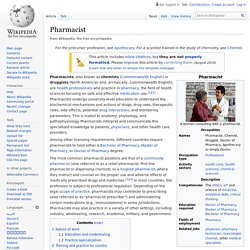
This is mated to anatomy, physiology, and pathophysiology. Pharmacists interpret and communicate this specialized knowledge to patients, physicians, and other health care providers. Among other licensing requirements, different countries require pharmacists to hold either a Bachelor of Pharmacy, Master of Pharmacy, or Doctor of Pharmacy degree. Nature of work[edit] Education and credentialing[edit] Practice specialization[edit] Specialties include:[citation needed] Training and practice by country[edit] Armenia[edit] Canada[edit] Pharamist Jobs and Working Conditions. A pharmacist is an important medical worker who aids physicians. Pharmacist Hourly Wages and how key factors impact Pharmacist Hourly Wages - Salary.com. Pharmacist Salary. Many Pharmacists can be found at CVS / Pharmacy, Walgreen's Pharmacy, Rite Aid Pharmacy, Wal-Mart Stores, Inc, and CVS Caremark Corporation, firms that are at the top of the field.
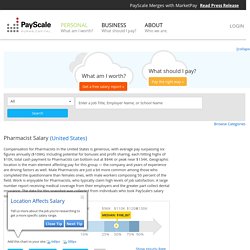
Pharmacists in search of the best pay head to Target Corporation, where the median salary rolls in at $122K. Although pay is top-notch overall, it does seem to be curbed at $141K, which isn't dramatically higher than the lower-end figure of $95K. Pharmacists. Pharmacists must pay attention to detail, ensuring the accuracy of the prescriptions they fill.
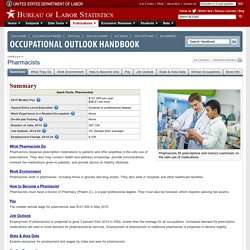
Pharmacists must have a Doctor of Pharmacy (Pharm.D.) degree from an accredited pharmacy program. Pharmacist: Educational Requirements and Career Summary. Pharmacist. Overview In recent years, pharmacist has been consistently ranked as among the best jobs in the United States.
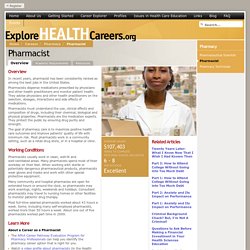
Pharmacists dispense medications prescribed by physicians and other health practitioners and monitor patient health. They advise physicians and other health practitioners on the selection, dosages, interactions and side effects of medications. Pharmacists must understand the use, clinical effects and composition of drugs, including their chemical, biological and physical properties. Pharmacists are the medication experts. The goal of pharmacy care is to maximize positive health care outcomes and improve patients' quality of life with minimum risk. Working Conditions. Pharmacist - Career Rankings, Salary, Reviews and Advice. Overview The white-coated professionals at your neighborhood drug store do a lot more than just fill prescriptions.
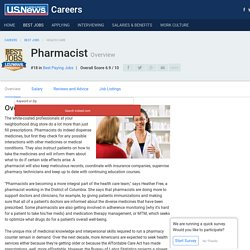
Pharmacists do indeed dispense medicines, but first they check for any possible interactions with other medicines or medical conditions. They also instruct patients on how to take the medicines and will inform them about what to do if certain side effects arise. A pharmacist will also keep meticulous records, coordinate with insurance companies, supervise pharmacy technicians and keep up to date with continuing education courses. "Pharmacists are becoming a more integral part of the health care team," says Heather Free, a pharmacist working in the District of Columbia. The unique mix of medicinal knowledge and interpersonal skills required to run a pharmacy counter remain in demand. Scorecard Read about how we rank the best jobs.
How to Become a Pharmacist. Pharmacists help patients with medication and therapy.
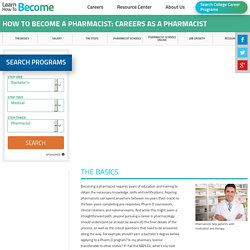
Becoming a pharmacist requires years of education and training to obtain the necessary knowledge, skills and certifications. Aspiring pharmacists can spend anywhere between six years (fast-track) to thirteen years completing pre-requisites, Pharm.D coursework, clinical rotations and national exams. And while this might seem a straightforward path, anyone pursuing a career in pharmacology should understand (or at least be aware of) the finer details of the process, as well as the critical questions that need to be answered along the way.
For example, should I earn a bachelor’s degree before applying to a Pharm.D program? Is my pharmacy license transferable to other states? The following “how to” guide serves as a starting point. Search Pharmacy Degree Programs.